Introduction
In today's online world, we know that everyone goes to Google whenever they have a question. Online reverse mortgage calculators, for instance, have become a go-to for many homeowners looking to tap into their home's equity. In fact, I’d say almost all of our clients try an online reverse mortgage calculator before speaking to us.
It seems innocent enough: you want to learn more about reverse mortgages and see how much you could get with a reverse mortgage.
But, as with many things on the internet, not everything is as it seems. If you are a Canadian homeowner and want to explore reverse mortgages, read on to learn about the dangers of using reverse mortgage calculators that are top-ranked by Google.
Danger #1: US vs. Canada Differences
When you type "reverse mortgage calculator" into Google, your screen will be filled with options to click on.
But here's the catch: many of these sites are American websites. Now, you might wonder as a Canadian homeowner, "What's the big deal? Or you might think, “I’m sure they’re close enough.”
Well, the reverse mortgage landscape in the US is not the same as it is in Canada.
Learn More:
Canadian Reverse Mortgages vs American Reverse Mortgages
While reverse mortgages are offered in both countries, their eligibility rules are different. It's like using a metric ruler for an imperial measurement – the result is bound to be off.
Here is a simple example of a big difference between American and Canadian reverse mortgages: the minimum age to qualify for a reverse mortgage in the US is 62. In Canada, it is 55.
Here is what happens when you use the #2 result on Google and enter your age as 55 in their online reverse mortgage calculator:
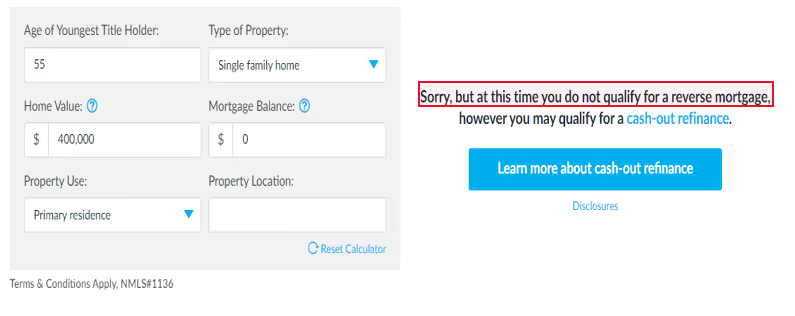
In this case, a homeowner who is 55 years old will think they don’t qualify for a reverse mortgage— unless, of course, they were to do more research online (or maybe speak to a reverse mortgage expert at RetireBetter 😁).
The key point here is that a homeowner who is 55 years old actually would qualify for a Canadian reverse mortgage (such as a CHIP Reverse Mortgage).
How else can a Canadian homeowner get misleading information by using an online American reverse mortgage calculator? Interest Rates!
Let’s look at the #1 result on Google to show you how Canadian homeowners get misleading information from the top ranking online reverse mortgage calculators:

Are you wondering how these rates compare to the Canadian reverse mortgage interest rates being offered by reverse mortgage lenders? Of course, they are different.
Here are the current reverse mortgage interest rates for CHIP Reverse Mortgages (HomeEquity Bank) and Flex Reverse Mortgages (Equitable Bank) in Canada:

While I never recommend a retired homeowner make a decision about reverse mortgages based on interest rates alone (it’s a lifestyle product, after all), I know that seniors do take interest rates into consideration. As a result, we have to use accurate information!
Let’s stick with this same top-ranked reverse mortgage calculator on Google to show you another reason Canadian seniors should stay away from American reverse mortgage calculators: wrong loan balances!
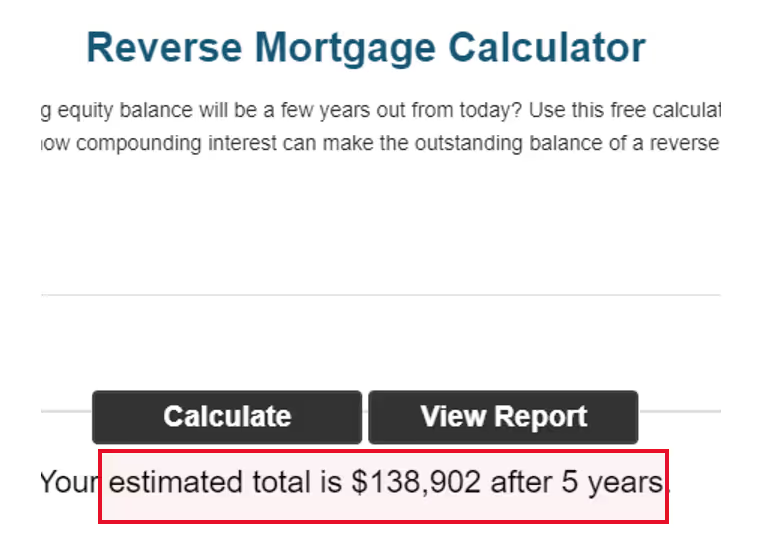
This American online reverse mortgage calculator will lead a Canadian homeowner to think a $100,000 reverse mortgage would have a balance of $138,902 after 5 years.
Imagine their surprise if they were to speak to a reverse mortgage specialist (like everyone at RetireBetter—sorry, couldn’t resist) who will inform them a Canadian reverse mortgage would have a balance of $149,742—a difference of almost $11,000 more!
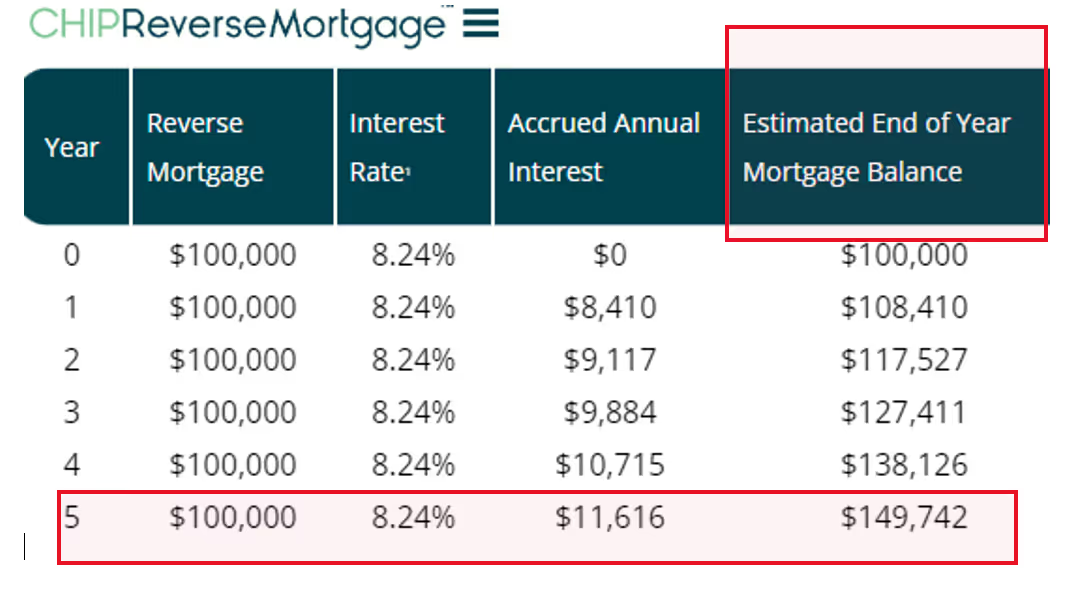
If you thought those were the only reasons to be careful using top-ranked Google sites for reverse mortgage calculators, there is actually one more reason: Wrong qualifying amounts!
Here is what that #2 Google-ranked calculator says a 62 year old with a $400,000 primary residence would be eligible to receive:
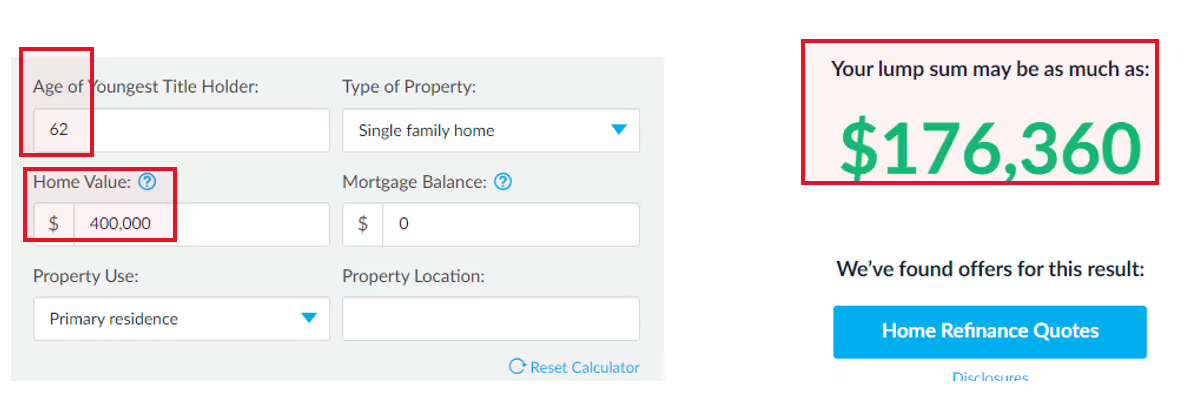
Meanwhile, if we use a Canadian reverse mortgage calculator, that same homeowner would be eligible to receive approximately $150,000—15% less than what they initially thought they were eligible to receive.
To sum up, Google gives plenty of American options if you search for a reverse mortgage calculator online. If a Canadian homeowner isn’t careful, they will get unreliable loan amounts, loan balances and eligibility information.
Learn More:
Let’s Discuss Reverse Mortgage Horror Stories
Our Experts Review the CHIP Reverse Mortgage
Danger #2: Sharing Personal Information
Another alarming trend is many websites play games before giving you the information you want to know about reverse mortgages. Before they show you your results, they ask for your personal details. Name, phone number, email – sometimes they ask for your address too.
Considering these websites may already have your age, they can end up with a detailed profile about you. Are you comfortable with that?
Here are 2 examples from top-ranking search results on Google where users were asked to provide their contact information before the online reverse mortgage calculator results were provided.

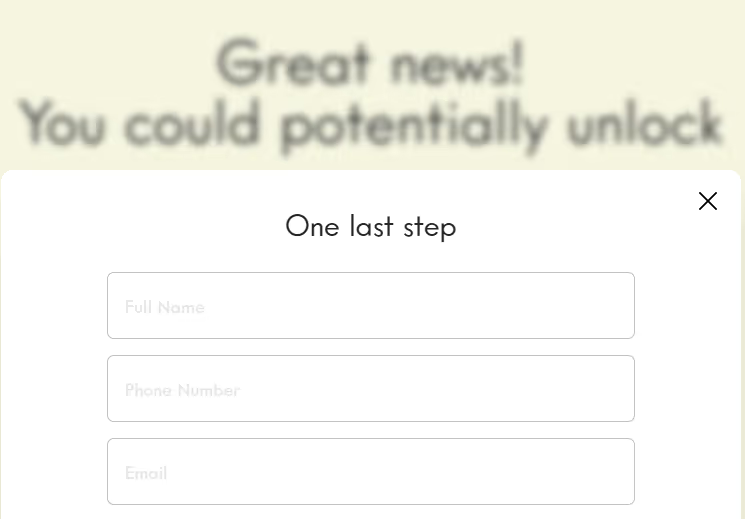
In today’s world, sharing personal information online always comes with a risk. For starters, there's the obvious threat of data breaches, where malicious actors could get a hold of your details.
But there's also the annoyance factor of unwanted marketing.
By providing your details, you effectively agree to receive unsolicited offers, phone calls, and a cluttered email inbox. Are you comfortable with that just to get a simple answer to a basic reverse mortgage question?
Danger #3: High Rank, Low Expertise
If you were to do the same search yourself, you'll probably notice that some of the top-ranking sites for reverse mortgage calculations aren't even dedicated to reverse mortgages. They're general finance websites.
Now, these sites might be great for generic financial advice or broad overviews, but when it comes to specialized information about reverse mortgages, they often miss the mark.
If these top-ranked sites aren’t accurate, why do they rank so high on Google for “reverse mortgage calculator” searches? Several reasons.
These general finance sites rank highly because they:
- Use very sophisticated SEO (Search Engine Optimization) strategies
- Have a wide range of content that attracts vast amounts of traffic
- Invest heavily in advertising
All of these factors result in Google thinking they should be highly ranked.
But high Google rankings don't equate to expertise. Especially when it comes to a unique financial product such as reverse mortgages.
Relying on these general finance sites for reverse mortgage insights is akin to asking a general practitioner about a specialized medical condition. Sure, they might have some knowledge, but you'd be better off consulting a specialist.
RetireBetter: Your Trusted Source for Reverse Mortgage Info in Canada
Can I chat with you about RetireBetter, Canada's largest reverse mortgage brokerage? We pride ourselves on being the go-to experts for all things related to reverse mortgages in Canada.
Our team understands the nuances, the regulations, and the specifics that make Canadian reverse mortgages unique.
Rather than relying on generic online calculators, we encourage homeowners to seek personalized advice. Every homeowner's situation is unique, and a one-size-fits-all calculator can't capture that.
With RetireBetter, you get insights tailored to your circumstances, ensuring accuracy and clarity. And yes, you’re welcome to use our online Canadian reverse mortgage calculator that does not require any personal information!
After you use our reverse mortgage calculator, feel free to explore our website to learn about Canadian reverse mortgages. Remember, the calculator is only the first step in any question about reverse mortgages. Regardless of your results, you should keep looking into the suitability of reverse mortgages.
Learn More:
Unlocking the Benefits of Reverse Mortgages
Which Lenders Offer Reverse Mortgages in Canada?
An Introduction to Reverse Mortgages in Ontario
While you are on our website, you can also try our anonymous Reverse Mortgage Suitability Quiz, download our expert-written Guide to Canadian Reverse Mortgages (full disclosure, we do ask for your email address in order to send you the guide) or simply book a no-obligation call to chat with us about reverse mortgages.
Learn More:
Why you MUST use a broker to get a reverse mortgage
Wrapping Up
The internet is a world of information, but it's important to use it carefully, especially when making financial decisions.
For Canadian homeowners, I hope our message is clear: be careful using online reverse mortgage calculators. And when in doubt, always turn to trusted experts in the field. After all, your well-being in your retirement is too valuable to leave to chance.
Reach out to RetireBetter for guidance that's both expert-driven and personalized. We're here to help you navigate the reverse mortgage landscape with confidence.
FAQ
What are the most important things to know about a reverse mortgage?
Here are the key takeaways about reverse mortgages:
- Available across Canada for homeowners over the age of 55
- No monthly mortgage payments required, no income requirements and bad credit ok
- Only for your principal residence, not cottages or rental properties
- Access up to 59% of your home’s value
- Receive tax-free cash as lump sum or installments
- existing mortgage must be paid off
Are reverse mortgages safe for retired homeowners?
Reverse mortgages are very popular and more seniors are getting reverse mortgages than ever before. With this growing popularity, lenders such as HomeEquity Bank continue to have satisfaction ratings over 90%.
Reverse mortgages in Canada are also regulated by the Canadian government. Taken together, you should not be worried about the safety of reverse mortgages. They are not scams.
Learn More:











